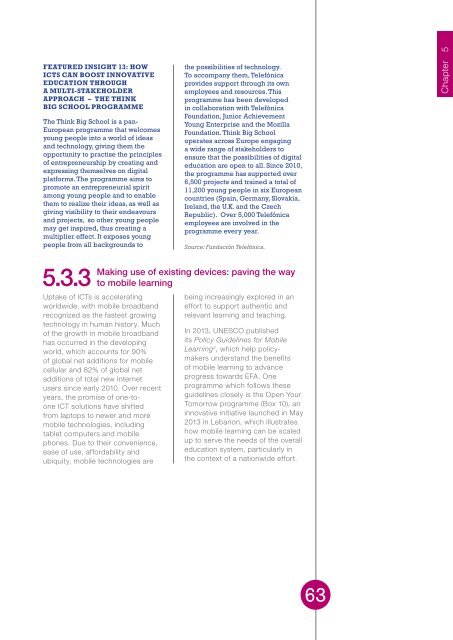DI8xz
DI8xz
DI8xz
Create successful ePaper yourself
Turn your PDF publications into a flip-book with our unique Google optimized e-Paper software.
Featured Insight 13: HowICTs can boost innovativeeducation througha multi-stakeholderapproach – The ThinkBig School ProgrammeThe Think Big School is a pan-European programme that welcomesyoung people into a world of ideasand technology, giving them theopportunity to practise the principlesof entrepreneurship by creating andexpressing themselves on digitalplatforms. The programme aims topromote an entrepreneurial spiritamong young people and to enablethem to realize their ideas, as well asgiving visibility to their endeavoursand projects, so other young peoplemay get inspired, thus creating amultiplier effect. It exposes youngpeople from all backgrounds to5.3.3the possibilities of technology.To accompany them, Telefónicaprovides support through its ownemployees and resources. Thisprogramme has been developedin collaboration with TelefónicaFoundation, Junior AchievementYoung Enterprise and the MozillaFoundation. Think Big Schooloperates across Europe engaginga wide range of stakeholders toensure that the possibilities of digitaleducation are open to all. Since 2010,the programme has supported over6,500 projects and trained a total of11,200 young people in six Europeancountries (Spain, Germany, Slovakia,Ireland, the U.K. and the CzechRepublic). Over 5,000 Telefónicaemployees are involved in theprogramme every year.Source: Fundación Telefónica.Making use of existing devices: paving the wayto mobile learningUptake of ICTs is acceleratingworldwide, with mobile broadbandrecognized as the fastest growingtechnology in human history. Muchof the growth in mobile broadbandhas occurred in the developingworld, which accounts for 90%of global net additions for mobilecellular and 82% of global netadditions of total new Internetusers since early 2010. Over recentyears, the promise of one-tooneICT solutions have shiftedfrom laptops to newer and moremobile technologies, includingtablet computers and mobilephones. Due to their convenience,ease of use, affordability andubiquity, mobile technologies arebeing increasingly explored in aneffort to support authentic andrelevant learning and teaching.In 2013, UNESCO publishedits Policy Guidelines for MobileLearning 2 , which help policymakersunderstand the benefitsof mobile learning to advanceprogress towards EFA. Oneprogramme which follows theseguidelines closely is the Open YourTomorrow programme (Box 10), aninnovative initiative launched in May2013 in Lebanon, which illustrateshow mobile learning can be scaledup to serve the needs of the overalleducation system, particularly inthe context of a nationwide effort.Chapter 563


